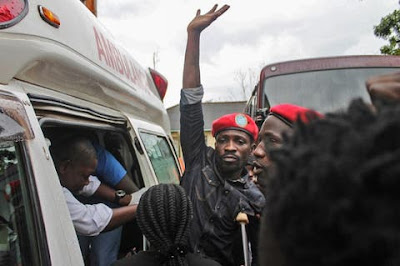Uganda’s opposition leader Bobi Wine said the country’s election had seen “widespread fraud and violence”, as votes trickled in Friday under an internet blackout.
The 38-year-old former popstar-turned-MP did not give details about his accusations, which contradicted the government’s account that Thursday’s vote had been largely peaceful.
The internet remained down for a third day as vote counting continued, with provisional results from 24 per cent of polling stations giving President Yoweri Museveni an early lead of 65 per cent while Wine trailed with 27 per cent.
The capital Kampala was quiet and some businesses remained closed, while soldiers and police patrolled on foot the day after the election.
Full results are expected by Saturday afternoon.
Museveni is seeking a sixth term in office, having ruled for almost four decades, and his main rival among 10 opposition candidates is Wine, whose popularity among a youthful population has rattled the former rebel leader.
Voting in Kampala took place under the oppressive security presence of soldiers and riot police in the streets and at polling stations.
The election followed the most violent campaigns in years, with harassment and arrests of the opposition, attacks on the media and scores of deaths.
However, election commission chief Simon Mugenyi Byabakama said the vote had gone off in a “peaceful and tranquil manner”.
Police spokesman Fred Enanga said there had been “no major cases of violence reported.”
But a senior foreign diplomat told AFP there had been sporadic incidents of violence and many irregularities but no sign of mass manipulation.
The US, EU, UN and global rights and democracy groups have raised concerns about the integrity and transparency of the election.
Only one foreign organisation, the African Union (AU), has sent monitors, along with an AU women’s group.
On Wednesday, the United States, a major aid donor to Uganda, announced it was cancelling a diplomatic observer mission after too many of its staff were denied permission to monitor the election.
Wine has vowed non-violent street protests should Ugandans feel the election was stolen.
Museveni has warned that using violence to protest the result would amount to “treason”.
He has ruled Uganda without pause since seizing control in 1986 when he helped to end years of tyranny under Idi Amin and Milton Obote.
Once hailed for his commitment to good governance, the former rebel leader has crushed any opposition and tweaked the constitution to allow himself to run again and again.
And for many in the country, where the median age is 16, Museveni’s glory days are no longer relevant or sufficient.
But the 76-year-old — one of Africa’s longest-serving leaders — has never lost an election and observers expect this time around will be no different.
His opponents — most visibly Wine, who spent much of the campaign in a bulletproof vest and combat helmet — were arrested, blocked from rallying and dispersed with tear gas throughout the campaign.
Two days of protests in November led to the deaths of 54 people.

